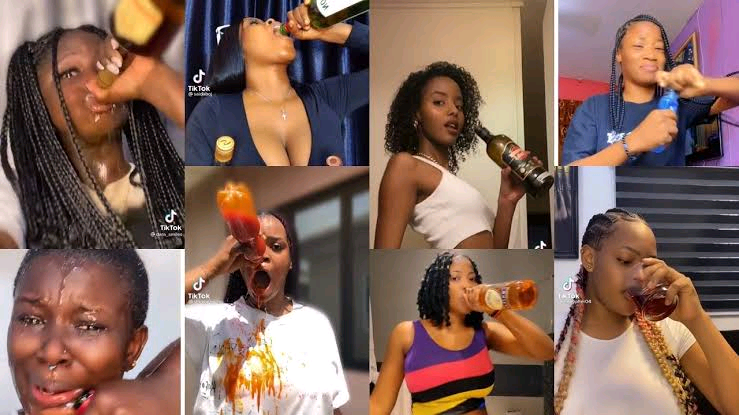Despite the turbulent year of 2021, which was marked by alarming incidences of insecurity, immeasurable misery, and a Twitter ban, Nigerians found a way to ‘cruise’ and make themselves joyful by generating widely used slang.
A new year brings new slang, and in 2021 alone, Nigerian music singers, celebrities, social media influencers, and comedians developed no fewer than 21 pop culture slang. Although their origins can sometimes be traced, these viral sayings have stuck around, especially since they appeal to people of various ages, social classes, and religions.
Below are some of the viral slang and challenges that trended in 2021
”E Choke”

David “Davido” Adeleke, a well-known Nigerian singer, coined this renowned and currently popular street slang. “E Choke” means “It Chokes,” but in street slang, it refers to something massive or spectacular.
”We Outside”
This is a slang term for being alone or with friends on the streets doing wild things. Outside the country, people are said to be having a good time.
When someone captions a photo “We outside” with friends or alone, they are simply expressing “We are having fun ‘outside'” (abroad).
”Ment”
The word ‘mental’ is the root of the word ‘ment.’ It is slang for questioning someone’s sanity or saying they are completely insane.
”SAPA”
The term ‘SAPA’ has recently become the most popular on social media, with individuals singing it.
It is a Pidgin English phrase for being completely broke or impoverished, usually as a result of excessive spending.
It is also known as the spirit of poverty, which is virtually always directed towards one individual.
”Japa”
This is a Yoruba-derived Nigerian slang phrase that simply means ‘to flee quickly’ from a perilous circumstance.
Abort, run, avoid, terminate, retreat, or remove yourself from a situation are all terms used to describe japa. “His girlfriend told him she was pregnant, which is why the guy japa,” it would sound like in a sentence. It also refers to the act of emigrating.
”We Meuuve”

“We Meuuve” is a popular slang that originated as a parody of BBNaija 2020 star Vee Adeyele’s accent during a fight with her partner, Neo Akpofure, on the show.
When Neo was attempting to keep Vee from leaving the room, Vee was heard telling him to “meuuve from the door” (move from the door).
The phrase has gained in popularity as a motivating slogan and a method for Nigerians to express themselves. “but then, we meuuve!” is a common conclusion to many gloomy tales.
”Who dey breet”

While the connotations of this lingo may be difficult to decipher, Davido first used it on March 14, just hours after Wizkid and Burna Boy won Grammy awards. “Who is breathing” is the literal meaning.
”Silhouette Challenge”

The Silhoutte challenge was a TikTok trend that includes dancing provocatively as a silhouette while most of your body is concealed by a red filter.
It began as a body-positive movement that encouraged women to embrace their sexual sides while also celebrating their bodies. People of all shapes and sizes began flaunting their figures on social media, where they received encouragement, admiration, and praise.
”Alcohol Challenge”

The goal is to drink alcohol while dancing or acting to Joeboy’s song Alcohol. However, the challenge, which began with the consumption of alcoholic beverages, swiftly evolved into a weird fad. People began consuming dangerous chemicals such as bleach, Dettol, palm oil, and other substances to complete the challenge.
While the initial challenge had participants drinking food-based or alcoholic beverages, some Nigerians have gone as far as to consume antiseptic solutions, uncooked rice, palm oil, and a variety of other items that should be avoided in print.
”Something Hooge”
Mr Sabinus, sometimes known as investor Sabinus or Mr Funny, is a well-known Nigerian comedian who popularized the term.
“Something hooge” literally translates to “something enormous,” with the accent on the word “extensive.” It’s a word that means “I’m looking forward to it.”
”Doings”

Oba – a peaceful farming community in Anambra State – was catapulted into the spotlight after Obi Cubana, a prominent Nigerian nightlife entrepreneur, conducted a talk of the town funeral for his late mother in July. When someone looks to live large or flaunt their money, the phrase is often used as an exclamation.
”Werey Dey Disguise”
Another Yoruba pidgin street slang term, ‘Werey’ signifies unreasonable or crazy in Yoruba. In total, “werey dey disguise” means “the act of camouflaging, seeming, or speaking out in contradiction to what you truly mean.”
“Werey dey disguise,” which is generally followed by multiple memes, is used when someone is behaving badly but you can see right through them.
”Zukwanu Ike”
“Zukwanu like” is an Igbo slang term that means “have a rest oo” or “do have a rest.”
When someone is overburdening you or is worrying you out over something, this term is employed.
”Where Una Dey See This Money?”
This statement is frequently used whenever someone brags about their fortune while others suffer in poverty.
“Where Una dey see this money?” loosely translated means, “Where did you get this money you are lavishing?” It is generally followed by ‘cut soap for me.’
”Wahala be like”
‘Wahala be like…’ is a slang phrase that may survive 2021. It has outlasted other lingo. Even the trending phrase “be calming down” faded with time. It was eventually renamed “Wahala be like bicycle,” “Wahala be like Noodles,” etc.
”Cut Soap For Me.”
To various people, the phrase “cut soap for me” might indicate a variety of things.
It is thought to have originated with internet fraudsters known as the Yahoo Yahoo lads. In fact, legend has it that the phrase was coined by a ‘Yahoo Yahoo’ youngster who went insane and screamed “Cut Soap For Me!” in the streets.
”The Stingy Men’s Association”

The Nigerian Stingy Men Association trended on social media early this year. The group was tasked with preventing Nigerian men from spending money on women and instead of directing it toward more useful endeavours.
Many major Nigerian stars, including Don Jazzy and Rudeboy, among others, shared their ID cards on social media a few days ago, causing the association to become a social media sensation.
The oath of fealty of the organization allows males to refuse to provide “shishi” to any member of the opposite sex. “Shishi” is a Nigerian slang term that means “nothing.”
“Milk Crate Challenge”
The idea of stepping across a stack of milk crates was first popularized in 2011 when JoyRidersTV Bonus Footy uploaded a video titled “Guy falls off six milk crates.”
On August 1, two guys posted the first known incident of the milk crate challenge to Facebook. The trend quickly spread across social media, with TikTok becoming the most popular platform.
”Shedi bala bala”
A catchy tune that drew Nigerians’ attention via Tiktok videos nearly took over the always-buzzing entertainment and social media arena.
DJ Basplit’s routine, which featured Bobby Banks as the hypeman, encouraged women to wriggle their bottoms. The hook throbbed through nightclubs and parties, and it seemed that no celebration was complete until the DJ played the track.
”Dorime’’
‘ERA-Ameno,’ a French new age musical effort written by Eric Levi and titled ‘ERA-Ameno,’ is a pseudo-Latin song popularly known as ‘Ameno,’ ‘Ameno Dorime,’ or simply ‘Dorime.’
‘Era,’ a single from his debut album, was released in 1996 and was a hit in Latin America, France, Sweden, and Belgium.
The vocals of Harriet Jay and Guy Protheroe, together with the instruments and composition of the song, have a captivating influence on listeners. Some have called the song a ‘curse song because of its possessive sound, which consists of a pitch-altered Gregorian chant over an unbalanced minimalist electronic music,’ which garnered widespread appeal this year, particularly on Tiktok. However, it immediately became one of the most popular sounds in Nigerian nightclubs.
Even though most people think the song is innocuous, some nightclub patrons have claimed to have an uncommon drive to overspend whenever it is played. Some additionally claimed that they felt compelled to buy drinks they had not planned to buy whenever the opportunity arose.
”Small yansh dey Shake”
Hypeman Emmyblaq, who is known for collaborating with club DJs, created the hit TikTok video ‘Small yansh dey shake.’
”Small yansh dey shake” is without a doubt one of the year’s most popular slangs. The euphemism, which began as a slang term to describe girls with little backsides who danced in clubs, is now used to describe people who accomplish surprising things, particularly after they have been undervalued.
”You want to bam bam”
The hook, ‘You want to bam,’ was published earlier this month by Goya Menor in conjunction with Nektunez and is a new amapiano-version of the song Ameno, which is probably one of the most talked-about songs of 2021.
‘You want to bam bam,’ like the others on this list, first became a viral success on Tiktok, with users uploading dancing videos to the song. It’s the Nigerian variant of Ameno, also known as Dorime
“God When”
“God When” has progressively gained popularity, asking God when he will do for you what he has done for others, just because whatever tweet (or photo) you have seen is exactly what your heart desires.











Discussion about this post